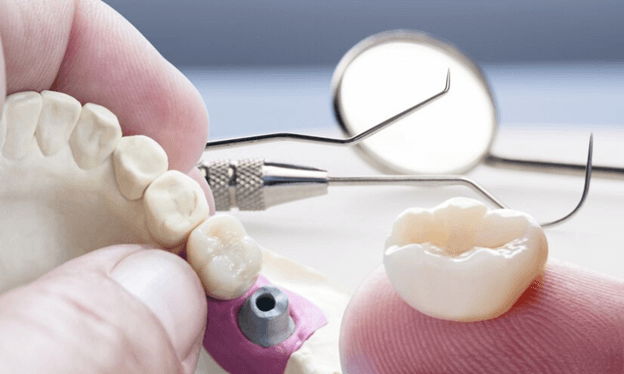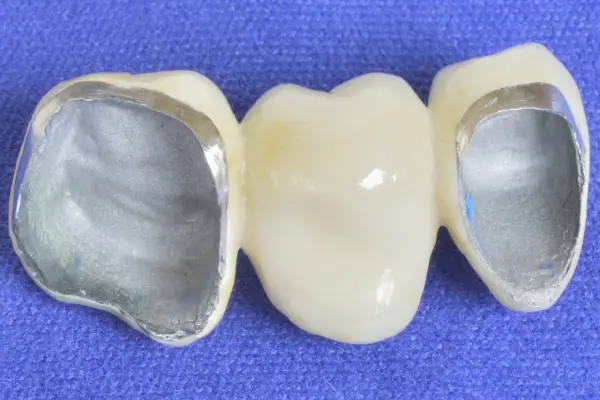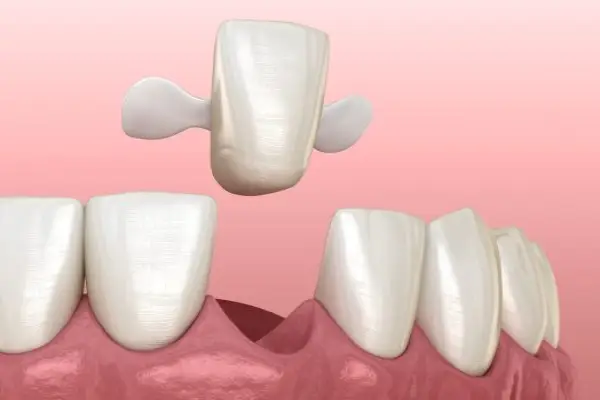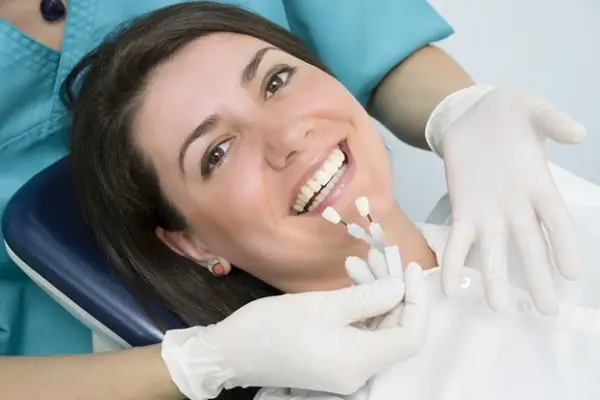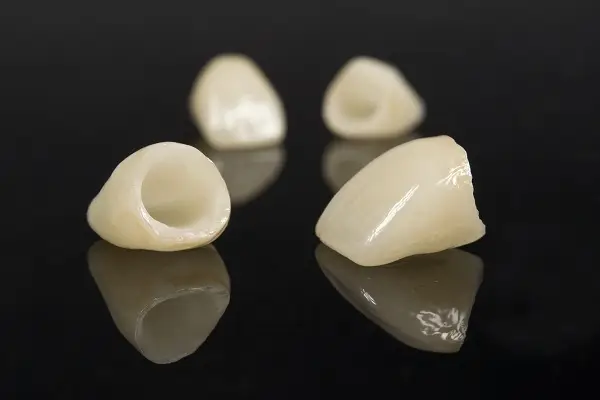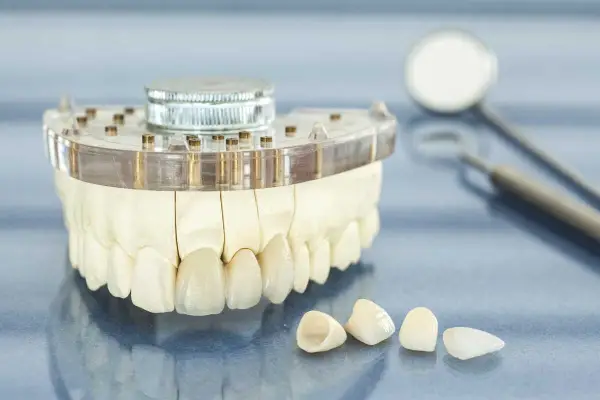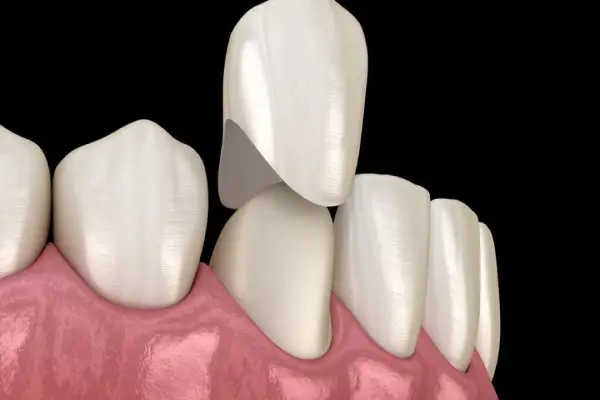Nowadays, more people are aware of cosmetic dental services and visit cosmetic dentists to enhance their smiles. Your smile is an important part of your character, helping you influence others when you first meet them.
Cosmetic dental treatments help you fix your teeth’ imperfections in order to have a flawless, shiny smile that can make you confident again. You may have many different choices, but it’s essential to make a wise decision based on your demands to have the best results.
Our experienced cosmetic dentists at Dentist @ False Creek can help you choose the most suitable procedure according to your needs, condition and personal preferences. One of the most common treatments used to restore damaged teeth or replace lost teeth is dental crowns and bridges.
You can’t find a cosmetic dentist who doesn’t provide cosmetic dental bridges as one of the main procedures. After examining your oral condition, your cosmetic dentist can determine whether you qualify for these treatments. Then it’s time to make customized dental bridges and crowns using digital X-rays and computerized treatment planning.
These dentistry technologies help you have the most realistic and natural-looking dental bridges and crowns, making you feel good when you smile. Continue reading today’s blog and gain all information you need.
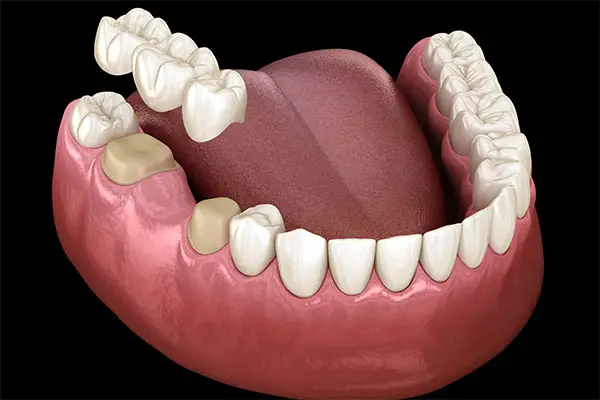
What Are Dental Bridges?
If you have lost more than a tooth, you can consider dental bridges an excellent tooth replacement option. Compared to other tooth replacement options like dental implants or dentures, dental bridges have their unique benefits. The process of getting a tooth bridged is quick, easy and straightforward, so you can save your time more efficiently.
It’s highly recommended to consider dental bridges if you have lost a few teeth, as they can be designed to replace multiple missing teeth at once, tailored to your unique needs.
Types of Bridges
-
Conventional Bridges: The most common type of bridge, this one is anchored to two abutment teeth on either side of the missing tooth.
-
Maryland Bridges: Also known as resin-bonded bridges, these bridges use a special type of resin to bond the crowns to the abutment teeth.
-
Cantilever Bridges: This type of bridge is supported by a single abutment tooth on one side of the missing tooth.
-
Pendulum Bridges: This type of bridge is supported by two abutment teeth on one side of the missing tooth and a small anchor on the other side.
Benefits of Dental Bridges
Dental bridges offer several benefits, including:
-
Replacement of missing teeth: Bridges can restore the function and aesthetics of your smile by replacing missing teeth.
-
Improved chewing and speech: Bridges can help you chew and speak more easily by providing a strong base for your teeth.
-
Improved oral health: Bridges can help to prevent further cavities and tooth decay and gum disease by filling in the space where a tooth was missing.
Risks of Dental Bridges
There are some risks associated with dental bridges, including:
-
Tooth damage: The abutment teeth may need to be prepared for the bridge, which can cause some discomfort and sensitivity.
-
Decay: If the bridge is not properly cared for, it can be a breeding ground for bacteria, which can lead to decay.
-
Removal: If the bridge becomes loose or damaged, it may need to be removed and replaced.
What Are Dental Crowns?
You can get a dental crown for additional protection if your tooth is severely damaged. Unlike cosmetic dental veneers that cover just the tooth’s front surface, crowns can protect the entire visible portion of your problematic tooth.
Dental crowns are mainly used to restore the strength of damaged teeth and improve teeth with cosmetic defects. Furthermore, you can get a crown immediately after root canal treatment to prevent your tooth from getting damaged again.
Types of Crowns
-
Porcelain-fused-to-metal (PFM) crowns: These crowns are made of porcelain bonded to a metal base. They are durable and offer a natural-looking appearance.
-
All-ceramic crowns: These crowns are made entirely of porcelain. They are more aesthetically pleasing than PFM crowns but may be more fragile.
-
Gold crowns: Gold crowns are durable and long-lasting, but they may not be as aesthetically pleasing as other options.
Benefits of Dental Crowns
Dental crowns offer several benefits, including:
-
Improved function: Crowns can restore the function of a damaged tooth by providing a strong, stable base.
-
Improved aesthetics: Crowns can improve the appearance of a chipped, discolored, or misaligned tooth.
-
Protection against decay: Crowns can protect a damaged tooth from further decay.
Risks of Dental Crowns
There are some risks associated with dental crowns, including:
-
Tooth preparation: The tooth that is going to receive a crown will need to be prepared, which can cause some discomfort and sensitivity.
-
Cost: Dental crowns can be expensive, especially gold crowns.
-
Replacement: If the crown becomes loose or damaged, it may need to be removed and replaced.
When Are dental Bridges and Crowns Needed?
As we have already talked about veneers vs crowns, now we are talking about Bridges and crowns are typically needed to replace missing teeth when:
- One or more teeth are missing due to decay, injury, or disease
- There is not enough remaining tooth structure to support a filling
- A tooth has been weakened by extensive decay or gum disease
- A tooth has a large filling and is at risk of breaking
When to See a Dentist
If you have a missing tooth or a damaged tooth, you should see an emergency dentist to discuss your options. Dental bridges and crowns can be a great way to restore the function and aesthetics of your smile.
What to Expect During Treatment
The process of getting a bridge or crown typically involves multiple visits to the dentist. During the first visit, your dentist will examine your teeth and gums and determine the best type of restoration for your needs. They will then take impressions of your teeth and gums to create a model of your mouth.
At a subsequent visit, the dentist will remove some tooth structure from the abutment teeth to create a space for the crowns or bridge. The crowns or bridge will then be fabricated in a dental lab.
During a final visit, the dentist will cement the crowns or bridge to your teeth and ensure that they are fitting properly.
Aftercare
After getting a bridge or crown, it is important to follow your dentist’s instructions carefully. You should avoid chewing hard foods, smoking, and using toothpicks near the restoration. You should also brush and floss your teeth regularly to maintain good oral hygiene.
Why Should You Get Dental Crowns or Bridges?
If you have a damaged or missing tooth, you can be a good candidate for crowns or bridges. For instance, crowns can help you have a shiny smile if professional teeth whitening isn’t effective on your teeth. It can also restore your damaged or decayed tooth perfectly. On the other hand, bridges are excellent for replacing missing teeth if you don’t like dental implants.
In conclusion, discuss with your cosmetic dentist, as they can help you choose the right path!
Conclusion
Dental bridges and crowns are effective restorations that can help you regain a healthy, confident smile. By following your dentist’s instructions and maintaining good oral hygiene, you can ensure that your bridge or crown lasts for many years.
FAQ
How much do dental bridges and crowns cost?
The cost of dental bridges and crowns can vary depending on the type of restoration, the materials used, and the location of your dentist. However, in general, dental bridges are more expensive than dental crowns.
What are my options if I cannot afford dental bridges or crowns?
If you cannot afford dental bridges or crowns, there are a few other options available, such as partial dentures or dental implants. However, these options may not be as durable or aesthetically pleasing as dental bridges or crowns.
Contact Us
Looking for a trusted dentist who understands your child’s dental needs? Our experienced dentists and caring staff are here to listen to your concerns patiently and provide you and your child with a wide range of specialized dental treatments and personalized attention in a stress-free, friendly, and welcoming environment. We believe that there is nothing more important than children’s health and happiness in the world!
Let’s create a shiny smile for your kid – book an appointment with Dentist@FalseCreeck today!
Doctor Consultation
Dentist @ False Creek Clinic in Vancouver to schedule an appointment and discuss your concerns with our experienced team.
Location
1681 Manitoba St Vancouver, BC V5Y 0B8
